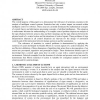Free Online Productivity Tools
i2Speak
i2Symbol
i2OCR
iTex2Img
iWeb2Print
iWeb2Shot
i2Type
iPdf2Split
iPdf2Merge
i2Bopomofo
i2Arabic
i2Style
i2Image
i2PDF
iLatex2Rtf
Sci2ools
107
click to vote
IFIP
2001
Springer
2001
Springer
Semiotics and Intelligent Control
The overall purpose of this paper is to demonstrate the relevance of semiotics concepts to the analysis of intelligent control systems. Semiotics has only a minor impact on research within intelligent control or robotics. These areas are currently dominated by mathematical concepts of control theory and information processing concepts of artificial intelligence. This situation is unfortunate because the understanding of a complex control problem requires an analysis of the sign relations between sensory data and their meanings and the sign relations between the physical result of a control action and the intentions of control agents. These problems of sign interpretation inherent in all control situations are relevant for the design of automated controls and of the interaction between human operators and the automation. The relevance of semiotics to control problems is demonstrated by applying the semiotics of action developed by Charles Morris to various aspects of a control situatio...
Related Content
| Added | 30 Jul 2010 |
| Updated | 30 Jul 2010 |
| Type | Conference |
| Year | 2001 |
| Where | IFIP |
| Authors | Morten Lind |
Comments (0)

